|
|
|
Sort Order |
|
|
|
Items / Page
|
|
|
|
|
|
|
| Srl | Item |
| 1 |
ID:
165741
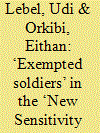

|
|
|
|
|
| Summary/Abstract |
In recent decades (the ‗post-heroic‘ condition) - threats of widespread selective conscientious objection have become a political tool to advance opposing political agendas in Israel. This article examines attitudes amongst the Israeli public concerning the legitimacy of demands that different groups of soldiers be exempted from military operations to which they are ideologically opposed (such as serving in the occupied territories or, conversely, participating in evacuation of settlements). The results point to a multi-cultural model embracing diversity management not as a neo-liberal ideal but rather as a strategy for co-option, containment and inclusion, with a view to preserving the “people's army” model.
|
|
|
|
|
|
|
|
|
|
|
|
|
|
|
|
| 2 |
ID:
091097
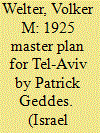

|
|
|
|
|
| Publication |
2009.
|
| Summary/Abstract |
This essay approaches the 1925 master plan for Tel-Aviv by the biologist and town planner Patrick Geddes by asking which aspects of his concept of the modern city attracted representatives of the Zionist movement. While the idea of the region-city was applicable to Palestine at large, Geddes's conviction that the modern city had to grow from history was particularly relevant for the resettlement of the ancient Jewish homeland. Geddes planned modern Tel-Aviv as both a part of Palestine and a logical extension of the ancient city of Jaffa. Geddes borrowed decisive features of his plan from his earlier plan for Balrampur, India, and from the historic plan of Edinburgh, Scotland.
|
|
|
|
|
|
|
|
|
|
|
|
|
|
|
|
| 3 |
ID:
126921
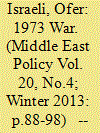

|
|
|
| 4 |
ID:
190987
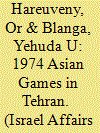

|
|
|
|
|
| Summary/Abstract |
As a close ally of Shah Muhammad Reza Pahlavi, Israel participated in the September 1974 Asian Games – the ‘Asian Olympics’ – that were held in Tehran. Among the 18 sports in which athletes competed, football attracted the most attention, especially after Iran’s historic victory over Israel in the AFC Asian Cup in 1968. As both countries reached the final of the Games’ football tournament, the match came to be seen by Iranians as nothing short of war. Standing in stark contradiction to the close and multifaceted relations between Jerusalem and the monarchical regime, this public attitude was lost on Israeli decisionmakers in what foreshadowed the failure to anticipate the Islamic revolution and the attendant collapse of Iranian-Israeli relations five years later.
|
|
|
|
|
|
|
|
|
|
|
|
|
|
|
|
| 5 |
ID:
185266
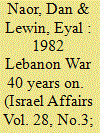

|
|
|
|
|
| Summary/Abstract |
Forty years after its occurrence, the 1982 Lebanon war remains academically understudied with the received wisdom about the conflict largely based on political and journalistic accounts. According to these accounts, the war was a political ploy by Defence Minister Ariel Sharon and Prime Minister Menachem Begin aimed at achieving far-reaching political goals rather than a defensive attempt to remove the terrorist threat to Israel’s northern areas. By placing the conflict within the context of Israeli history and the Arab-Israeli conflict, on the one hand, and the nature and characteristics of modern warfare, on the other, this article offers a more nuanced interpretation of the Lebanon War, showing that it was not fundamentally different from past military encounters.
|
|
|
|
|
|
|
|
|
|
|
|
|
|
|
|
| 6 |
ID:
128073
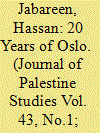

|
|
|
|
|
| Publication |
2014.
|
| Summary/Abstract |
The Oslo accords have been the subject of considerable debate ever since the
first agreement was signed in 1993. Most of the literature on the agreements
has dealt with their impact on the occupied territories (e.g. the growth of
settlements, the separation barrier, restrictions on movement), to the near
exclusion of the situation inside the Green Line. This essay, by contrast, focuses
on Oslo's consequences with regard to the status of the Palestinian citizens of
Israel, and the way that the conflict is conceptualized by Israeli Jewish society.
|
|
|
|
|
|
|
|
|
|
|
|
|
|
|
|
| 7 |
ID:
064750
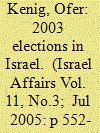

|
|
|
| 8 |
ID:
074088
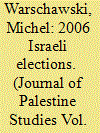

|
|
|
|
|
| Publication |
2006.
|
| Summary/Abstract |
This report looks at major trends shown by Israel’s March 2006 elections, despite the lowest voter turnout in the country’s history (fueled by disgust at corruption). Most important, the resounding defeat of the Likud and the Right in favor of the “center” confirmed a shift in political culture away from the Greater Israel ideology and permanent preemptive war against terrorism (i.e., the Palestinians) and the emergence of a broad consensus on unilateral separation (not peace), seen as the guarantor of security and normalcy. Also discussed are the early hopes raised by Amir Peretz’s election as Labor party head (and his subsequent domestication), the return of a certain discourse of social justice after years of uncontested neo-liberalism, and the durability of the “community” or ethnic vote. The letter ends with a look at coalition politics in Israel and the formation of the new government.
|
|
|
|
|
|
|
|
|
|
|
|
|
|
|
|
| 9 |
ID:
079200
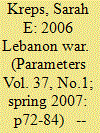

|
|
|
| 10 |
ID:
119257
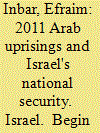

|
|
|
|
|
| Publication |
Israel, Begin Sadat Centre for Strategic Studies, 2012.
|
| Description |
29p.pbk
|
| Series |
Mideast Security and Policy Studies No. 95
|
| Standard Number |
07931042
|
|
|
|
|
|
|
|
|
|
|
|
Copies: C:1/I:0,R:0,Q:0
Circulation
| Accession# | Call# | Current Location | Status | Policy | Location |
| 057185 | 956.054/INB 057185 | Main | On Shelf | General | |
|
|
|
|
| 11 |
ID:
129894
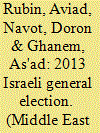

|
|
|
|
|
| Publication |
2014.
|
| Summary/Abstract |
Despite resulting in a different party configuration, the results of the 2013 Israeli general election support a similar agenda to the one set by the previous government. A year following its establishment, all indicators suggest that the current government continues to deepen neoliberal policies. Nevertheless, this election reflects two important trends: first, an ever growing discontent in Israeli public that probably would not find a solution during the tenure of the incoming government; second, lack of interest in the Israeli-Palestinian conflict that might generate negative long-term consequences.
|
|
|
|
|
|
|
|
|
|
|
|
|
|
|
|
| 12 |
ID:
174366
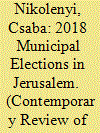

|
|
|
|
|
| Summary/Abstract |
This article analyzes the 2018 local elections in Jerusalem, the contested capital of the State of Israel. These elections were unique in terms of their level of competitiveness and fragmentation as well as producing a highly divided local government in the wake of the incumbent mayor’s, Nir Barkat’s, decision to leave the local political scene and enter national politics. While his party has no representation in city council, the new mayor of Jerusalem, Moshe Lion, built a broadly based new coalition that includes all parties in the council except for Hitorerut, the party that won the most seats and whose mayoral candidate, Ofer Berkovitch, was the runner-up to Lion. With the exception of the ultra-orthodox parties, national political parties that sought to interfere with the local electoral process to promote their candidates and lists by and large failed. Therefore, the governance of the city of Jerusalem once again fell under the control of the ultra-orthodox majority. Furthermore, even though the Arab population of East Jerusalem largely continued its traditional abstention from the electoral process, there was some evidence to suggest that a slight shift was taking place in that community in favor of participating in the institutional process of municipal government and democracy.
|
|
|
|
|
|
|
|
|
|
|
|
|
|
|
|
| 13 |
ID:
185263
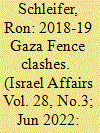

|
|
|
|
|
| Summary/Abstract |
This article examines the violent clashes between Hamas and Israel along the Gaza Fence (30 March 2018–27 December 2019) from a psychological operations (PSYOP) perspective. It shows how Hamas managed, through a skilful combination of mass riots, media manipulation, and quick adaptation to changing circumstances to subvert the strategic priorities of the Israel Defence Forces (IDF), wear down Israeli morale, and erode Israel’s sovereignty in its southern region – all this while deterring Israel from launching a large-scale military operation in Gaza. As such, the Gaza Fence clashes provide an example of a PSYOP-based strategy that can be applied to other border conflict zones, such as Morocco, Saudi Arabia, Mexico, and Islamist insurrections.
|
|
|
|
|
|
|
|
|
|
|
|
|
|
|
|
| 14 |
ID:
187567
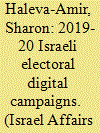

|
|
|
|
|
| Summary/Abstract |
This article focuses on the three Israeli digital campaigns during 2019–20 elections through their most prominent negative trends, namely: fake news, accounts and identities; politicians’ chat bots; influence and interruption networks, illegal information accumulation on Israeli citizens via social media and voting apps; anonymous and fake spam, and a complete lack of compliance with the statutory and regulatory framework. With technology’s speedy advancement, legal tools’ lagging, and political actors’ exploitation of the situation to their benefit, it seems that these campaigns, setting forth a fifth phase of political communication – Algorithmic Campaigns – constitute a rather bleak and grim future, as far as elections are concerned, thereby calling for rethinking.
|
|
|
|
|
|
|
|
|
|
|
|
|
|
|
|
| 15 |
ID:
178537


|
|
|
|
|
| Summary/Abstract |
2019 marked the 25th anniversary of normalizing Jordanian-Israeli relations and the ‘warm’ peace-making between the two countries. Representing key partners and neighbours in the Middle East, Jordan and Israel have maintained political and economic ties since 1994. The pro-Western stance of both countries, and their common interest in maintaining regional stability, led Jordan and Israel to pursue similar foreign policy aims regarding various regional upheavals, as well as the Palestine-Israeli dispute. Jordanian-Israeli relations have, however, been caught amidst shifts in the US’s Middle East Policy under the Trump administration, which has raised questions over the status of Jerusalem and the West Bank. With respect to these developments, this article argues that the disaccord between the US/Israel and Jordan over these two places reveals that a politics of identity remains a pillar of the Kingdom’s stability and survival. Although both countries are being confronted with the same regional challenges, particularly in the wake of the war in Syria, the re-emergence of the rhetoric of ‘Jordan is Palestine’ – which poses the country as an alternative homeland for Palestinians (al-watan al-badil) – nowadays constitutes the top security concern for the Hashemite monarchy, and has the potential to undermine Jordanian-Israeli relations going forward.
|
|
|
|
|
|
|
|
|
|
|
|
|
|
|
|
| 16 |
ID:
016295
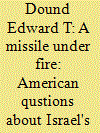

|
|
|
|
|
| Publication |
June 28, 1993.
|
| Description |
40-41
|
|
|
|
|
|
|
|
|
|
|
|
|
|
|
|
| 17 |
ID:
077305


|
|
|
|
|
| Publication |
2007.
|
| Summary/Abstract |
The 'separation fence' 'constructed by Israel to isolate itself from the Palestinians' raises many questions. Why was the construction of a fence perceived by the Israelis as a solution and as the only solution? What determined the specific, serpentine path of the fence and what impact does it have on both Palestinian and Israeli societies? A resulting reconfiguration of the power structure within Palestinian society is clearly unfolding and deserves analysis
|
|
|
|
|
|
|
|
|
|
|
|
|
|
|
|
| 18 |
ID:
058759
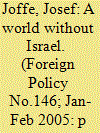

|
|
|
|
|
| Publication |
Jan-Feb 2005.
|
|
|
|
|
|
|
|
|
|
|
|
|
|
|
|
| 19 |
ID:
192474
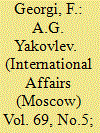

|
|
|
|
|
| Summary/Abstract |
THE Embassy of Russia in Israel has prepared an online exhibition, "A.G. Yakovlev: 10 Years of Service as Russian Imperial Consul General in the Holy Land," to honor the memory of outstanding diplomat and Orientalist Alexander Yakovlev (https://yakovlev-jerusalem.ru). The website has desktop and mobile versions. His biography, digitized archival materials, documents, and photos (some of them never before published) serve as an excellent illustration of the history of Russia's presence in the Holy Land in the latter half of the 19th century.
|
|
|
|
|
|
|
|
|
|
|
|
|
|
|
|
| 20 |
ID:
083697
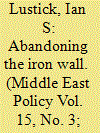

|
|
|
|
|
|
|
|